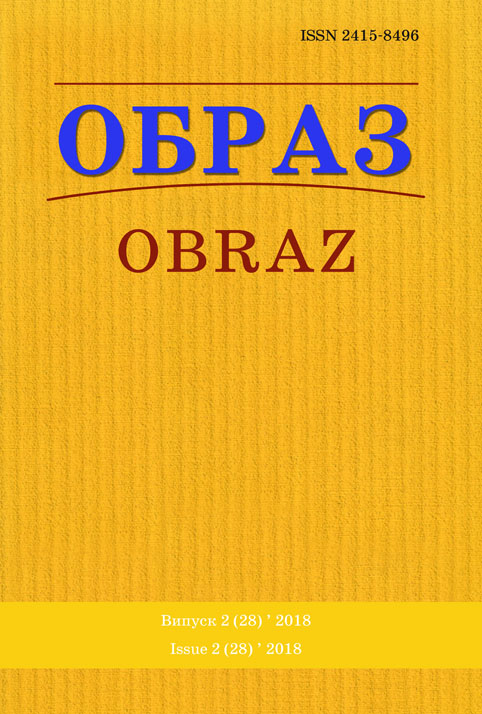Анотація
Мета статті – схарактеризувати мас-медійний образ концепту 8 Березня як прояв дискурсивної, ґендерованої влади. Розуміння сутності Міжнародного жіночого дня варіювалося під впливом різноманітних соціокультурних змін. Нині мас-медіа в трансляції смислів 8 Березня віддають перевагу тим із них, які внормовують невиразну суб’єктність жінки, її ледь що не природну залежність від різних проявів чоловічої уваги. Лінгвокультурологічний аналіз концепту 8 Березня виявив культурно-історичну традицію в позбавленні жінки суб’єктності, суспільному санкціонуванні її залежності від чоловіка. Моніторинг програм популярних українських радіостанцій засвідчив неабияке значення та вагому роль панівних чоловічих стереотипів і установок у моделюванні образу 8 Березня.
Посилання
1. Maslova, V. A. (2004), Cognitive Linguistics, TetraSistems, Minsk, 256 p.
2. Horoshko, E. I. (2009), Information-communicative Society in the Gender Dimension: monograph, FLP Liburkina L. M., Kharkiv, 816 p.
3. Kahanov, Yu. O. (2013), «Soviet Holidays and Ceremonies in the Context of Ideological Policy in Ukraine in the Second Half of the XX Century», Naukovi pratsi istorychnoho fakultetu Zaporizkoho natsionalnoho universytetu, issue 36, pp. 186–194, available at: www.nbuv.gov.ua/ UJRN/Npifznu_2013_36_33 (accessed 24 April 2018).
4. Kys, O. (2017), «Stolen Holiday: Historical Transformation of Meaning on March 8», available at: www.genderindetail.org.ua/library/feministichniy-ruh/8bereznia/ukradenesvyato-istorichni-transformatsii-smislu-8-bereznya-134409.html (accessed 24 April 2018).
5. «Almost 20% of Ukrainian Believe that March 8 Called to Remind Women’s Rights», available at: www.tns-ua.com/news/mayzhe-20-ukrayintsiv-vvazhayut-shho-8-bereznyapoklikano-nagaduvati-pro-prava-zhinok (accessed 24 April 2018).
6. «How Ukrainians relate to March 8», available at: www.galinfo.com.ua/news/yak_ ukraintsi_stavlyatsya_do_8_bereznya_253842.html (accessed 24 April 2018).
7. «Attitude of Ukrainians to Public Holidays, February 2018», available at: www.kiis.com.ua /?lang=ukr&cat=reports&id=758&page=1 (accessed 24 April 2018).
8. Popovych, M. V. (1998), Essay on the history of Ukrainian culture, Artek, Kyiv, 728 p.
9. Dictionary of the Ukrainian Language: in 11 vol., in Bilodid, I. K. (Ed.), vol. 1, 1970, Naukova Dumka, Kyiv, 799 p.
10. Dictionary of the Ukrainian Language: in 11 vol., in Bilodid, I. K. (Ed.), vol. 2, 1970, Naukova Dumka, Kyiv,550 p.
11. Karavanskyi, S. (1993), Practical Dictionary of Synonyms of the Ukrainian Language, Vyd-vo «Oriy» pry UKSP «Kobza», Kyiv, 472 p.
12. Udovychenko, H. M. (1984), The Phraseological Dictionary of the Ukrainian Language: 2 vol., vol. 1, Vyshcha shkola, Kyiv, 304 p.
13. Udovychenko, H. M. (1984), The Phraseological Dictionary of the Ukrainian Language: 2 vol., vol. 2, Vyshcha shkola, Kyiv, 384 p.
14. Martinek, S. V. (2008), Ukrainian Associative Dictionary: in 2 vol., vol.1: From stimulus to reaction, PAIS, Lviv, 344 p.
15. Martinek, S. V. (2008), Ukrainian Associative Dictionary: in 2 vol., vol. 2: From reaction to stimulus, PAIS, Lviv, 468 p.
16. Solonyna, Ye. (2018), «March 8: Women’s Day or Opening of the “Hunt for Voters” Season?», available at: www.radiosvoboda.org/a/29087367.html (accessed 24 April 2018).
17. «Consequences of March 8: what happens after», available at: www.genderindetail.org. ua/news/naslidki-8-bereznya-scho-vidbuvaetsya-pislya-134429.html (accessed 24 April 2018).
18. «Media is inclined to portray women as wasteful and shopaholic – research», available at: www.osvita.mediasapiens.ua/mediaprosvita/research/media_skhilni_zobrazhati_zhinok_yak_ marnotratnits_ta_shopogolikiv_doslidzhennya/ (accessed 24 April 2018).
19. «Relax and “Nashe radio” entered the top ten most rated radio stations – the data of the Radio Committees», available at: www.detector.media/rinok/article/133719/2018-01-15-relaxi-nashe-radio-uvishli-do-desyatki-naireitingovishikh-radio-standards-radiocommittee/ (accessed 24 April 2018).

Ця робота ліцензується відповідно до ліцензії Creative Commons Attribution 4.0 International License.

